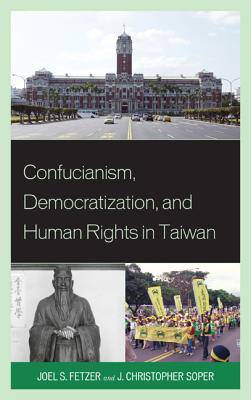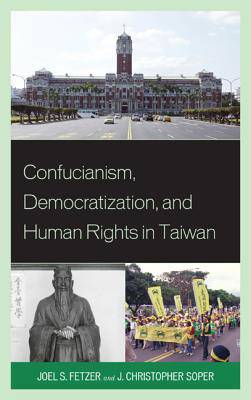
Nos liseuses Vivlio rencontrent actuellement des problèmes de synchronisation. Nous faisons tout notre possible pour résoudre ce problème le plus rapidement possible. Toutes nos excuses pour la gêne occasionnée !
- Retrait gratuit dans votre magasin Club
- 7.000.000 titres dans notre catalogue
- Payer en toute sécurité
- Toujours un magasin près de chez vous
Nos liseuses Vivlio rencontrent actuellement des problèmes de synchronisation. Nous faisons tout notre possible pour résoudre ce problème le plus rapidement possible. Toutes nos excuses pour la gêne occasionnée !
- Retrait gratuit dans votre magasin Club
- 7.000.0000 titres dans notre catalogue
- Payer en toute sécurité
- Toujours un magasin près de chez vous
Confucianism, Democratization, and Human Rights in Taiwan
Joel Fetzer, J Christopher Soper
Livre relié | Anglais
113,45 €
+ 226 points
Format
Description
Responding to the "Asian values" debate over the compatibility of Confucianism and liberal democracy, Confucianism, Democratization, and Human Rights in Taiwan, by Joel S. Fetzer and J. Christopher Soper, offers a rigorous, systematic investigation of the contributions of Confucian thought to democratization and the protection of women, indigenous peoples, and press freedom in Taiwan. Relying upon a unique combination of empirical analysis of public opinion surveys, legislative debates, public school textbooks, and interviews with leading Taiwanese political actors, this essential study documents the changing role of Confucianism in Taiwan's recent political history. While the ideology largely bolstered authoritarian rule in the past and played little role in Taiwan's democratization, the belief system is now in the process of transforming itself in a pro-democratic direction. In contrast to those who argue that Confucianism is inherently authoritarian, the authors contend that Confucianism is capable of multiple interpretations, including ones that legitimate democratic forms of government. At both the mass and the elite levels, Confucianism remains a powerful ideology in Taiwan despite or even because of the island's democratization. Borrowing from Max Weber's sociology of religion, the writers provide a distinctive theoretical argument for how an ideology like Confucianism can simultaneously accommodate itself to modernity and remain faithful to its core teachings as it decouples itself from the state. In doing so, Fetzer and Soper argue, Confucianism is behaving much like Catholicism, which moved from a position of ambivalence or even opposition to democracy to one of full support. The results of this study have profound implications for other Asian countries such as China and Singapore, which are also Confucian but have not yet made a full transition to democracy.
Spécifications
Parties prenantes
- Auteur(s) :
- Editeur:
Contenu
- Nombre de pages :
- 126
- Langue:
- Anglais
Caractéristiques
- EAN:
- 9780739173008
- Date de parution :
- 12-10-12
- Format:
- Livre relié
- Format numérique:
- Genaaid
- Dimensions :
- 152 mm x 229 mm
- Poids :
- 340 g







